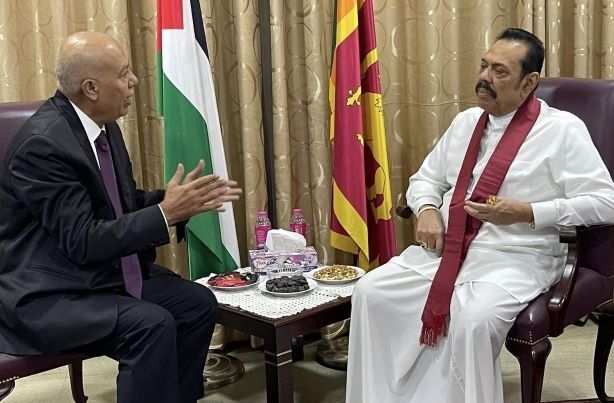Escalating tensions in Gaza under sharp focus in civil war-scarred Sri Lanka
By Meera Srinivasan
COLOMBO – The escalating tensions in Gaza have come under sharp focus in Sri Lanka, an island nation that is struggling to get out of its own devastating civil war, nearly 15 years after it ended.
While President Ranil Wickremesinghe recently called for a “four-state” solution involving Israel, Gaza, Palestine, and Lebanon, to resolve the crisis, he also shared his concerns with caretaker Prime Minister of Pakistan Anwaar-ul-Haq Kakar on Tuesday (17). The regional leaders are currently in China to attend the third Belt and Road Forum for International Cooperation.
According to an update posted by the Pakistani Prime Minister’s office on social media platform X, the two leaders expressed “deep concern at the grave humanitarian situation in Gaza caused by the ongoing Israeli attacks. They called for “immediate cessation of hostilities by Israel; establishment of a humanitarian corridor to provide aid to the besieged people of Gaza; and a two-state solution, resulting in the establishment of a viable and contiguous Palestinian State with pre-1967 borders and Al-Quds Al-Sharif as its capital”, the post said.
Meanwhile, key political actors from different parties in Sri Lanka have voiced concern on the ongoing violence.
Leader of Opposition Sajith Premadasa has called for an urgent parliamentary debate on the issue, while observing that “state terrorism” was leading to “hundreds of deaths”. On Wednesday (18), Premadasa presented a motion urging the House to call upon the United Nations to convene its Security Council to end the ongoing conflict. Terming the hospital bombing in Gaza a “massacre”, he urged the permanent members of the UN to take necessary measures to stop the “ongoing terrorism and state terrorism”.
The Gaza hospital bombing comes days before Sri Lanka’s Tamils, who bore the brunt of island’s long civil war, commemorate the brutal attack on the Jaffna teaching hospital in 1987 by members of the Indian Peace Keeping Force (IPKF). Some 70 civilians, including 21 medical personnel, were killed on October 21 and 22, 1987.
Prominent leaders have also visited the Palestinian Embassy in Colombo to express solidarity. Former President Mahinda Rajapaksa emphasized the urgency of peace in his recent meeting with the Palestinian Ambassador, Rajapaksa’s office said. “I have consistently supported the Palestinian cause as the Founder and President of the Sri Lanka Society for Solidarity with Palestine. War is never a solution,” said Rajapaksa, whose government is accused of committing grave human rights violations during the final phase of Sri Lanka’s civil war — fought between the armed forces and the Liberation Tigers of Tamil Eelam — which claimed at least 40,000 civilian lives. He has consistently denied the allegations, contending that his forces’ actions were part of a “humanitarian operation”.
However, in a report in 2009, Human Rights Watch noted that the Sri Lankan armed forces “repeatedly struck hospitals in the northern Vanni region in indiscriminate artillery and aerial attacks”.
In February that year, at least 50 civilians were reported killed in cluster bombs dropped by the Sri Lankan military over a hospital in Puthukudiyiruppu, in the northern Mullaitivu district.
Further, on Wednesday, Anura Kumara Dissanayake, Member of Parliament and leader of the leftist Janatha Vimukthi Peramuna (JVP) met the Palestinian Ambassador in Colombo to express solidarity. He sought the UN’s “fair intervention” and implementation of the two-state solution. Civic activists and rights defenders in Sri Lanka have also been organizing protests in solidarity with Palestine over the last few days.
-The Hindu



Comments are closed, but trackbacks and pingbacks are open.